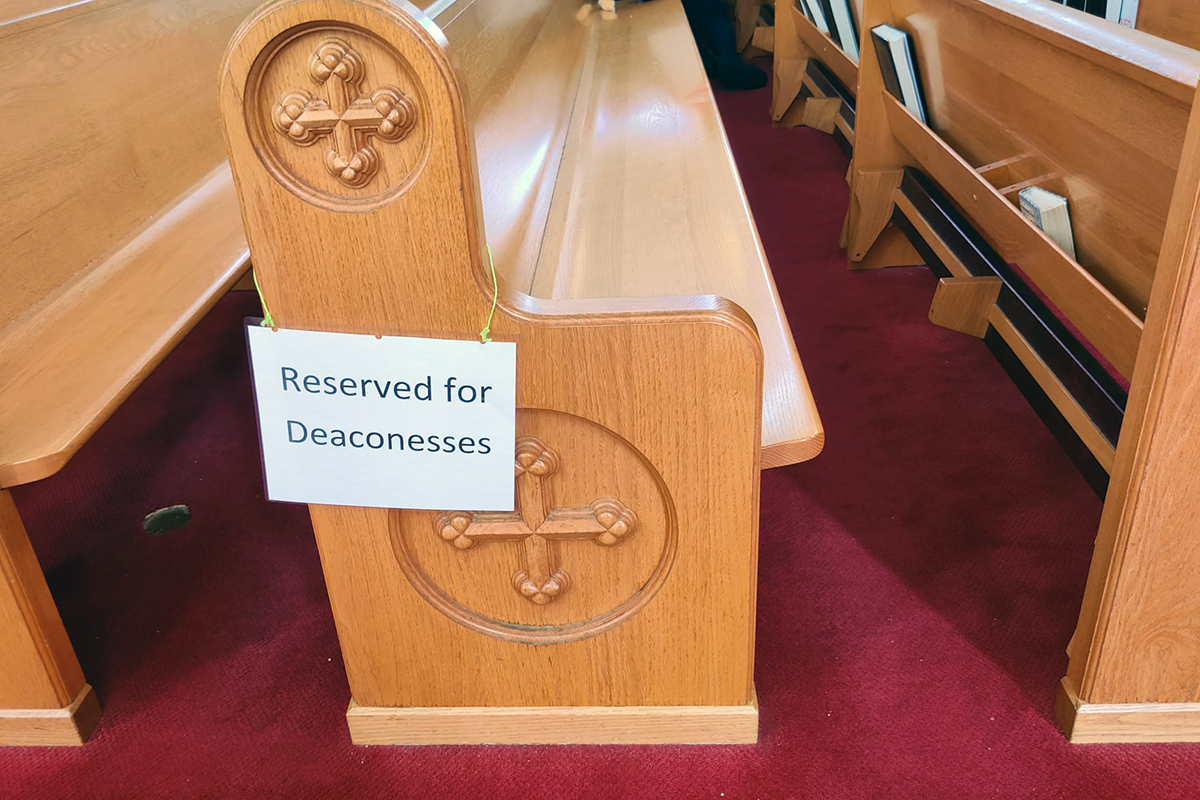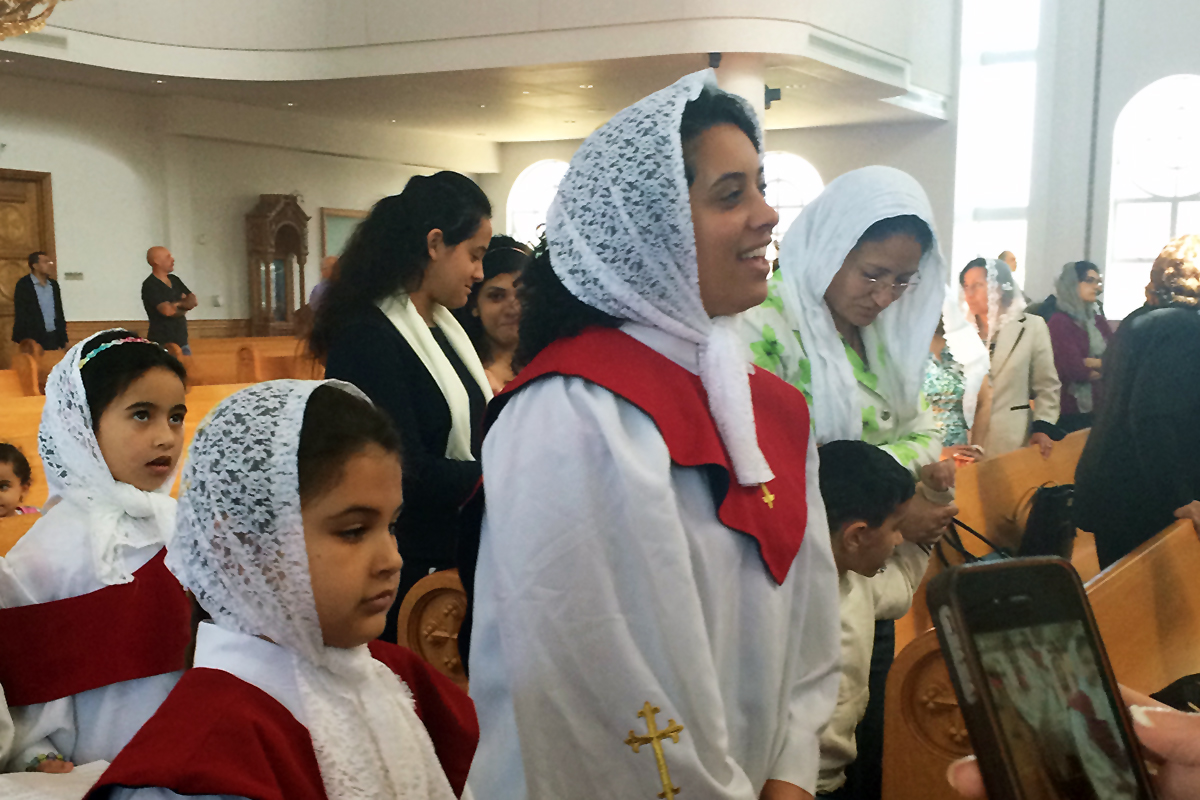On September 7, 2021, the Instagram account Coptic Women Sing Too posted its first Mu’allima Monday. That morning, followers were greeted by Mariam Youssef, a lecturer at California State University, Long Beach, in the Women and Gender Studies Department, who taught them the Nayrouz Psalm response in celebration of the Coptic New Year. Youssef’s voice rang out, “Alleluia, Esmoo Epi-eklom / Bless the Crown of the Year with your Goodness.”
On a platform filled with Christian cover bands and a cappella hymns, her act may seem small, but for Coptic Orthodox women like Youssef who are not allowed to lead a congregation in song or join an all-women choir within the wider Coptic Orthodox Church, singing is itself radically transgressive.
The term mu’allima is the feminine version of a mu’allim, or male singer within the Coptic Church. As Carolyn Ramzy of Carleton University, Ontario, explains, people don’t use the feminine version because, according to the Coptic Church, it should not exist. Church-sanctioned soloists, called cantors, lead the congregation in song during the Divine Liturgy and are exclusively men, although women serve as teachers and experts in Coptic liturgical music to train future generations of male cantors.
The Coptic Orthodox Church, also referred to as the Coptic Orthodox Patriarchate of Alexandria, based in Egypt, serves African, Middle Eastern, and diasporic communities around the globe. The stakes for singing in this Church could not be higher, both spiritually and communally. The Coptic view of afterlife, Ramzy explained, “is that eternity is sort of spent entirely in song, so that is how important it is to sing.” Therefore, a woman sharing her voice and recognizing its power is incredibly important to her Coptic religious identity.
“To be Coptic is to sing, and to be Coptic is to do music,” Youssef proclaimed. When she was told she couldn’t sing, it was in essence a mechanism of holding her cultural identity hostage.
Ramzy started the project Coptic Women Sing Too in 2019. She received a grant through the American Religious Sounds Project, supported by Michigan State University and The Ohio State University, to map Coptic diasporic centers across North America. Her project focused on how women were challenging church exclusion by creating their own musical spaces and fighting for musical leadership roles in Nashville, Los Angeles, and Toronto. She knew that women were sharing their voices online (outside of the regulations of the Coptic Church) through YouTube accounts like Coptic Women Sing, founded in 2015, but her research was focused on women singing in church services. The COVID-19 pandemic forced her to shift this research online, where she discovered that Coptic liturgical hymns known as alḥān abound in digital heritage and music archives, but, like in church spaces, the voices in these archives were only those of men.
The YouTube channel Coptic Women Sing inspired the Coptic Women Sing Too project, which now pays homage to these early efforts to represent and sound Coptic women’s voices.
The Coptic Women Sing Too website and Instagram account (which went live in May 2022) are named in honor of Coptic women’s musical skill and existence. Singers like Youssef are experts but do not have the chance to sing as soloists or in choirs solely composed of women. In uplifting Coptic women’s song on her website and Instagram, Ramzy and Youssef strive to challenge the gendered exclusion of women from musical leadership in the Church.
For Coptic Orthodox women, while there’s a prescribed space on how to navigate Coptic music culture, Ramzy said, “it’s one that is deeply segregated. It’s one that deeply involves a form of a sonic veiling, in which women have had to either quiet their voices or sing within a congregation.” Women cannot lead congregations in song as soloists and especially not from behind a microphone, so adding microphone “stickers” to their videos on Instagram challenge this exclusion while metaphorically and literally amplifying the voices of Coptic women.
As Youssef explained, Coptic Orthodox women are encouraged by clerics and spiritual mentors to become experts in Coptic hymns so that they can teach their sons and future male singers. Many men whose voices are represented in online archives were taught by women and profit from the unheard vocal labor of women. In fact, in the first private Coptic Christian schools in the United States, it is women who teach hymns alongside Coptic language, although they are not allowed to sing independently in church spaces. Youssef herself is a testament to female Coptic knowledge, along with each “Interview with the Experts” video posted on the Instagram account.
Ramzy recounted a private message she got from an auntie in New Jersey, the epicenter of a large Coptic diasporic community: she said that Holy Week, leading up to Easter, is her favorite time—“All I’m missing is a mustache. For [her], seeing Mariam singing [on Instagram] really galvanized me, actually because the lead deacon who was my student asked me to lower my voice.” Ramzy teamed up with Youssef to challenge this, to upset the Coptic Church rule that women cannot be a mu’allim andthe idea that mu’allima do not exist. On July 9, 2021, Ramzy formally invited submissions to the project using the hashtag #CopticWomenSingToo.
Youssef joined Ramzy shortly after the project’s inception, bringing fifteen years of experience advocating for Coptic women singers in Southern California. She helped found the Ecclesiastical Choir within the Coptic Orthodox Diocese of Los Angeles where women can learn and perform church hymns as soloists and in all-female choirs. But she also recognized that it is difficult for women to share their voices online because the majority still respect the authority of the clergy. She argues, however, that clergy do not have authority over the internet, although virtual gatekeepers known as Orthobros, mostly men but some women, still reinforce the disciplinary power of the Church through online trolling and reporting.
Samantha Elbouez and friends sing a parody of Lorde’s “Royals” called “Deacons: Take Two – Coptic Girls.”
In November 2021, Ramzy and Youssef shared a post “recognizing the kind of inaudibilities, to honor folks who are also self-censoring, who wanted to contribute but couldn’t,” Ramzy said. Several women submitted content to Ramzy but decided against publishing it online for fear of retaliation or criticism. Young Orthodox Copts are being warned about Instagram accounts that challenge the Church’s mainstream narratives, including this one. When curious church members heard the warnings, however, they wanted to know what the fuss was about, leading more eyes and ears to their page.
As the COVID-19 pandemic stretched on, Coptic churches began livestreaming services. Before the pandemic, women’s voices were protected or veiled through collective singing, raised in unison with men’s. During the pandemic, these female voices disappeared completely. The Divine Liturgy was livestreamed with barebone Church staff, almost all of whom were men.
When people did return to services in person—and many younger Millennial and Gen Z Copts did not—Youssef noted that gender-segregated seating could no longer exist. Seating was instead based on families to allow for better social distancing. With the increasing return to in-person worship, some churches are trying to return to segregated seating, but families are challenging the rule as they prefer to stand and sit together.
Youssef believes that hearing only men sing during the Divinity Liturgy on livestreams for months on end was the reason many people did not return to church. T he Coptic Women Sing Too project provides spaces where women’s voices can be recorded, celebrated, and, most importantly, not regulated. In doing so, it is turning up the heat on the Church. As Youssef made clear, “You won’t let us sing, that’s fine. We’ll sing over here. You won’t let us sing, fine. We won’t come. You won’t let us sing, see what the church looks like without women.” With more and more women leaving the church, this notion of “we’ll vote with our feet” places pressure on the Church by removing the invisible labor of women.
The terminology of “cantor ” is deeply interwoven with colonization, used by French and British colonizers to “save” Coptic oral tradition. In doing so, these colonizers researched and wrote about Coptic male singers without consulting or capturing women’s experiences in and contributions to Coptic music.
Similarly, the term mu’allima is itself a disruptor. “It just makes me sort of pause because the word exists,” Ramzy said. “But to take it seriously, to take women’s expertise seriously, was in itself an exercise to examine the gendering of expertise in our community, and its extension in coloniality, the idea that expertise is only relegated often to one class of folks and then translated for another class but never extended to women.”

The exercise of uplifting Coptic orthodox women’s voices is therefore itself an exercise in decolonizing the wider Coptic Church. What makes uplifting a mu’allima’s voice transgressive is not just the result of the gendered politics of the Coptic Church but also the diasporic experience of ancestral traumas and burdens. Therefore, Coptic Women Sing Too is itself also a reparative project. The project is rooted, Ramzy noted, in “this idea that we are starting to decenter a little bit the authority of the Church by saying, you know, we are becoming elders too. We are experts too. We sing too.” Her project exercises women’s agency and charge in Coptic music culture.
As someone’s whose Coptic identity is deeply intertwined with singing, Youssef believes that clergy depend on the idea that they hold the keys to the only space where someone can be Coptic Orthodox. But the Coptic Women Sing Too project reinforces that women can be practicing Orthodox Coptic individuals elsewhere, that their voices can be documented, uplifted, and celebrated in spaces other than the Church. This is part of a modern gender reckoning occurring across many orthodox institutions.
Hearing Youssef singing “Tethino” in Coptic and seeing Coptic girls wearing service vestments are radical evidence of a growing American religious movement—a movement founded on the idea of deconstructing gendered dimensions of song and religious identity, starting with words like mu’allima.
Emma Cieslik is a museum professional in the Washington, D.C., area and a former curatorial intern at the Center for Folklife and Cultural Heritage.


